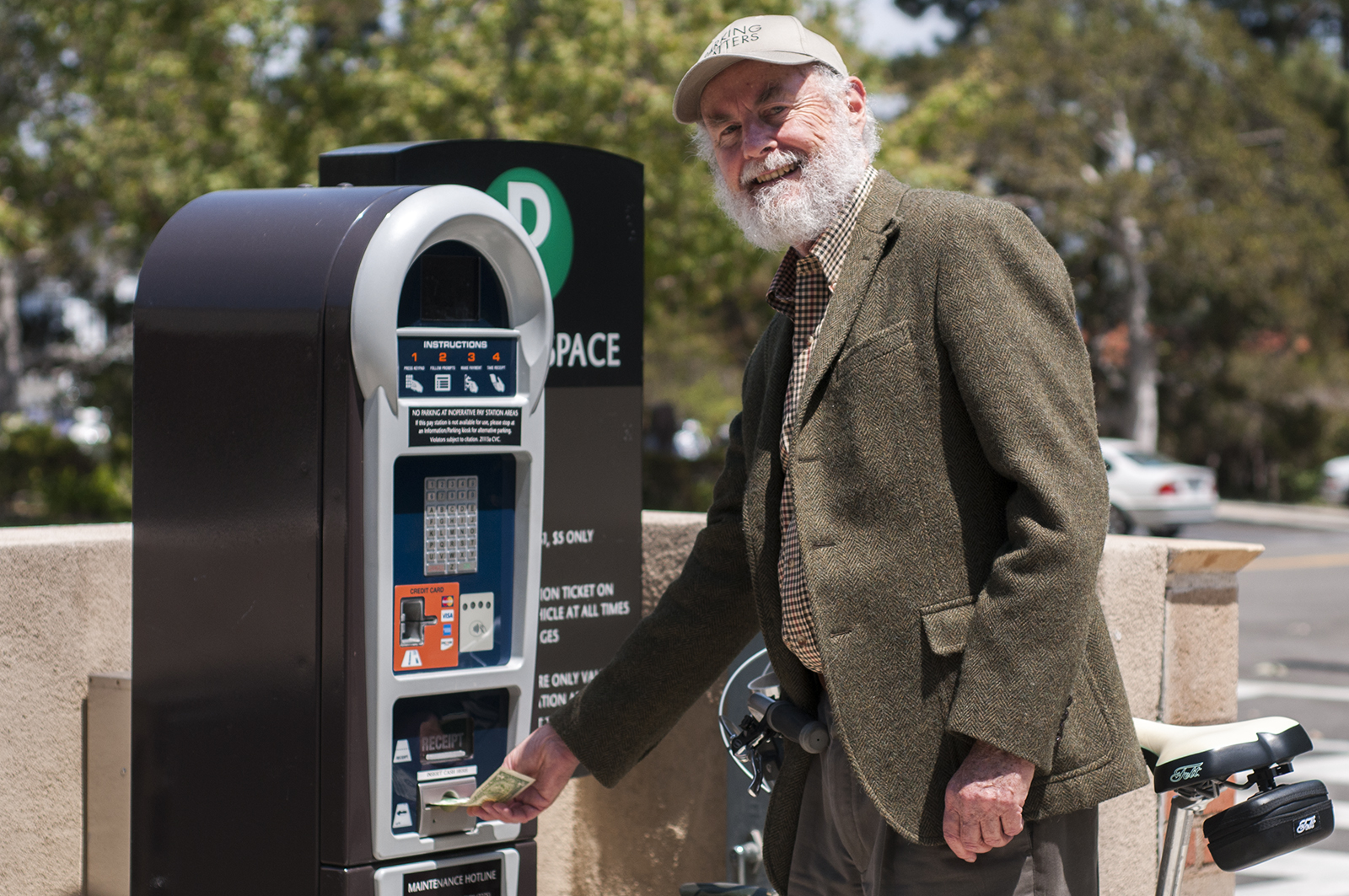UCLA urban planning professor to retire after 41 years of teaching

Urban planning professor Donald Shoup will retire at the end of the quarter after spending 41 years researching urban planning policy and parking regulations. (Max Himmelrich/Daily Bruin staff)
By Allison Ong
June 7, 2015 9:15 p.m.
Donald Shoup can bike from the Luskin School of Public Affairs to his nearby home without pedaling. In his 41 years teaching at UCLA, Shoup has biked or walked to work almost every day.
“If I push off from this building, I can coast all the way home if I get the green lights and run every stop sign,” he said.
Although he doesn’t drive often, Shoup has spent more than 40 years researching urban planning policies and parking regulations. He will retire from UCLA’s urban planning department at the end of this quarter.
The American Planning Association, a nonprofit educational and professional organization for urban planners, has recognized Shoup’s career in parking and transportation policy. In April, the association awarded Shoup a Planning Pioneer Award for redefining the relationship between transportation and land use.
“To UCLA, he has become a rock star related to his parking research,” said Evelyn Blumenberg, a professor and chair of the urban planning department. “He was a model faculty member, he has an unbelievable publication record (and) he is an excellent teacher.”
In 2005, Shoup published “The High Cost of Free Parking,” a book mapping some of his forefront parking policies. His ideas have since inspired a worldwide following of fans who call themselves the “Shoupistas,” and encouraged city planners in Los Angeles, Pasadena and San Francisco to install parking meter systems with prices that adjust based on demand.
Shoup and his wife launched the Donald and Pat Shoup Fellowship, a crowdfunding campign that has raised more than $70,000, through the Luskin School earlier this year. Shoup said he and his wife aim to reduce tuition for urban planning students, and plan to personally donate $2 for every dollar raised.
Shoup’s road to an urban planning career began with a degree in electrical engineering. After earning his doctorate in economics, Shoup’s work moved forward into planning, where he said he could apply economics to an urban landscape.
“Parking is the single biggest land use of any city,” Shoup said. “I thought that parking was important as a policy issue, but it was largely ignored as a research topic.”
The first policy Shoup proposed, called parking cash-out, was added to the Internal Revenue Code in 1997. It mandates that employers who rent parking space from a third party and offer it free to employees must also offer the spaces’ cash value to employees who don’t drive to work.
“I thought employer-paid parking was unfair because it gives nothing to people who ride the bus, who ride the bicycle or who walk to work,” Shoup said. “It was the inequity that originally caught my attention.”
Shoup said he has spoken about his ideas to audiences in the United States, China, Australia and Denmark.
“Most people are not interested in parking itself as a subject, but they are interested in air pollution, energy consumption or health,” he said. “I’ve been able to show a lot of people that parking is very important for what they’re interested in.”
The “Shoupistas,” transportation aficionados who began circulating Shoup’s ideas in San Francisco, have followed and praised his ideas for years. Their Facebook group currently has more than 2,500 Facebook members.
“What I feel good about is that the world is adopting policies that will make it a better place,” Shoup said. “The ‘Shoupistas’ are not about me, they’re about the ideas of parking reforms.”
Evan Moorman, a ‘Shoupista’ and graduate student in urban and regional planning, works with Shoup to edit the transportation policy magazine ACCESS. Moorman said Shoup’s blend of idealistic and realistic approaches is rare in academia.
“He’s definitely inspired me to make sure I can apply the lessons he teaches in my future career (in planning),” he said.
Shoup’s work extends beyond the UCLA campus. His research team has driven repeatedly through Westwood to collect data on parking trends in the Village.
“Given all the people who park at the curb, (cruising miles add) up to the equivalent of 36 trips around the Earth, or four trips to the moon,” Shoup said.
In August, the LA Express Park project will launch a meter system in Westwood that will adjust parking prices throughout the day with the help of subterranean sensors.
Peer Ghent, LA Express Park project manager, said prices will be set by time of day, ranging from 50 cents to $2 an hour. Other projects such as SFpark, which partially inspired the Westwood project, also use Shoup’s research to regulate the cost of parking.
Ghent added Shoup is excited to keep the Westwood project alive. He will continue his work in urban planning education even after his retirement, planning to teach voluntarily and accept more invitations to speak worldwide.
“Parking is a hot topic, and I’m used to speaking my message,” he said. “The greatest effect a professor can have is not through his publications, but through teaching students.”


